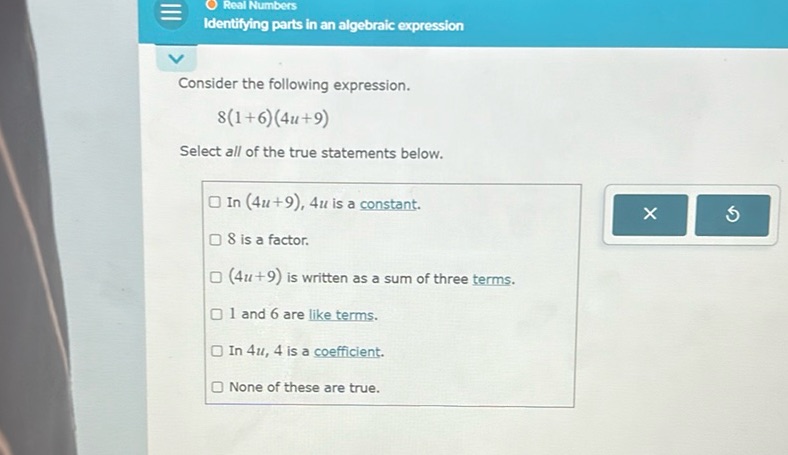Published
- 2 min read

Question: Consider the following expression. $$8(1+6)(4u+9)$$ Select all of the true statements below. -…
Consider the following expression.
$$8(1+6)(4u+9)$$
Select all of the true statements below.
- In $(4u+9)$, $4u$ is a constant.
- $8$ is a factor.
- $(4u+9)$ is written as a sum of three terms.
- $1$ and $6$ are like terms.
- In $4u$, $4$ is a coefficient.
- None of these are true.
Solution
The expression given is \(8(1+6)(4u+9)\). Let’s evaluate the statements: 1. In \( (4u + 9) \), \( 4u \) is a constant. - This is false. \(4u\) is not a constant; it is a term with a variable \(u\). 2. \(8\) is a factor. - This is true. In the expression \(8(1+6)(4u+9)\), the number \(8\) is a factor. 3. \( (4u + 9) \) is written as a sum of three terms. - This is false. The expression \(4u + 9\) has only two terms: \(4u\) and \(9\). 4. \(1\) and \(6\) are like terms. - This is true. Like terms are terms that have the same variables raised to the same power. Since \(1\) and \(6\) are both constants without variables, they are like terms. 5. In \(4u\), \(4\) is a coefficient. - This is true. In the term \(4u\), the number \(4\) is the coefficient of \(u\). 6. None of these are true. - This is false. Some statements are true. Therefore, the true statements are: - \(8\) is a factor. - \(1\) and \(6\) are like terms. - In \(4u\), \(4\) is a coefficient.

